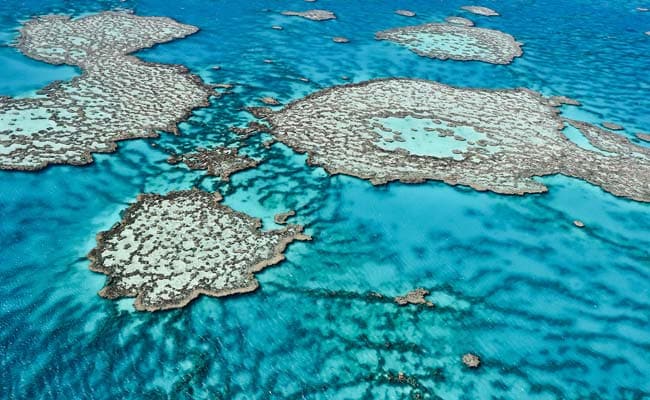
FIle Photo: An aeriel view of the Great Barrier Reef in Australia. (Agence France-Presse)
Paris:
The Great Barrier Reef will remain under surveillance but not be listed as endangered, according to a draft recommendation to the UN's World Heritage Committee, published today.
Australia has been worried that the world's greatest coral reef, which has had World Heritage Site status since 1981, could be formally listed as "in danger" when the panel meets next month.
A draft recommendation published on the UN Educational, Scientific and Cultural Organisation (UNESCO) website on today said the committee notes "with concern" the state of the reef today.
But it also said it "welcomes" Australia's 35-year plan to protect the reef.
It called on Australia "to rigorously implement all of its commitments" under the so-called Reef 2050 Long-term Sustainability Plan, and submit a progress report by December 2016.
"The overall outlook (for the reef) is poor," the document said bluntly.
"Climate change, poor water quality and impacts from coastal development are major threats to (its) health," it said.
"Key habitats, species and ecosystem processes in the central and southern inshore areas have continued to deteriorate from the cumulative effects of these impacts."
The Australian scheme seeks to reduce pollution runoff into the waters around the reef by 80 percent by 2025, limit port development and ban the dumping of dredged sediment.
The Great Barrier Reef is a biodiversity treasure, a national icon and a major generator of tourism revenue, helped by its UN status.
It covers 348,000 square kilometres (131,000 square miles) off Australia's east coast, with 2,500 individual reefs that are the home to unique corals, 1,500 species of fish and thousands of types of molluscs.
In 2011, UNESCO voiced "extreme concern" at the approval of liquefied natural gas processing and port facilities within the site and subsequently warned the reef could be classified "in danger".
Earlier today, Australian Environment Minister Greg Hunt said his government was making "once-in-a-century changes to ensure that a century from now, the reef won't just be as it is, but will be better and stronger than it has been since European settlement."
In a statement, green group WWF said Australia had been put "on probation."
"UNESCO has made the right decision," Dermot O'Gorman, head of its Australian branch, said.
"The future World Heritage status of the reef should rightly be determined based on the actual condition of its precious corals and marine life, as assessed by scientists."
UNESCO's World Heritage Committee determines whether natural, cultural and historical sites should be included in its list and monitors their state of conservation.
The panel, gathering 21 UN members, meets once a year. The draft recommendation will be put to its next session, running in Bonn, the former West German capital, from June 28 to July 8.
Other natural sites that will be scrutinised at this meeting include Lake Turkana National Parks in Kenya, Russia's Lake Baikal and the Chitwan National Park in Nepal.
Australia has been worried that the world's greatest coral reef, which has had World Heritage Site status since 1981, could be formally listed as "in danger" when the panel meets next month.
A draft recommendation published on the UN Educational, Scientific and Cultural Organisation (UNESCO) website on today said the committee notes "with concern" the state of the reef today.
But it also said it "welcomes" Australia's 35-year plan to protect the reef.
It called on Australia "to rigorously implement all of its commitments" under the so-called Reef 2050 Long-term Sustainability Plan, and submit a progress report by December 2016.
"The overall outlook (for the reef) is poor," the document said bluntly.
"Climate change, poor water quality and impacts from coastal development are major threats to (its) health," it said.
"Key habitats, species and ecosystem processes in the central and southern inshore areas have continued to deteriorate from the cumulative effects of these impacts."
The Australian scheme seeks to reduce pollution runoff into the waters around the reef by 80 percent by 2025, limit port development and ban the dumping of dredged sediment.
The Great Barrier Reef is a biodiversity treasure, a national icon and a major generator of tourism revenue, helped by its UN status.
It covers 348,000 square kilometres (131,000 square miles) off Australia's east coast, with 2,500 individual reefs that are the home to unique corals, 1,500 species of fish and thousands of types of molluscs.
In 2011, UNESCO voiced "extreme concern" at the approval of liquefied natural gas processing and port facilities within the site and subsequently warned the reef could be classified "in danger".
Earlier today, Australian Environment Minister Greg Hunt said his government was making "once-in-a-century changes to ensure that a century from now, the reef won't just be as it is, but will be better and stronger than it has been since European settlement."
In a statement, green group WWF said Australia had been put "on probation."
"UNESCO has made the right decision," Dermot O'Gorman, head of its Australian branch, said.
"The future World Heritage status of the reef should rightly be determined based on the actual condition of its precious corals and marine life, as assessed by scientists."
UNESCO's World Heritage Committee determines whether natural, cultural and historical sites should be included in its list and monitors their state of conservation.
The panel, gathering 21 UN members, meets once a year. The draft recommendation will be put to its next session, running in Bonn, the former West German capital, from June 28 to July 8.
Other natural sites that will be scrutinised at this meeting include Lake Turkana National Parks in Kenya, Russia's Lake Baikal and the Chitwan National Park in Nepal.
Track Latest News Live on NDTV.com and get news updates from India and around the world

